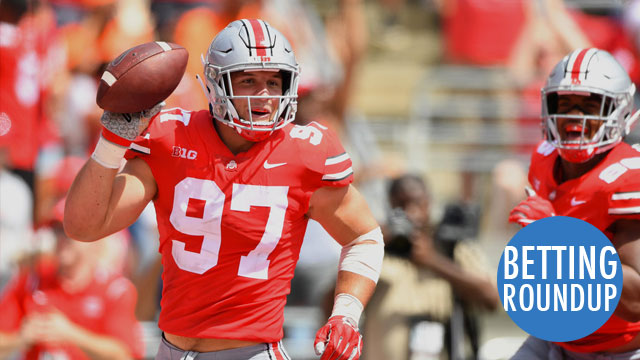MLB will change the way starting lineups are submitted in a response to expanded sports betting in the United States.
This year, clubs will be required to submit starting lineups to MLB’s data operations department at least 15 minutes before they are made public in an effort by the league to reduce the value of inside information and add uniformity to how data is disseminated.
Starting lineups and umpire assignments — two things valued by oddsmakers and bettors — will be released first on MLB’s official data feed.
In previous seasons, starting lineups were released randomly, sometimes by team social media accounts, other times by beat writers at the team clubhouses. Teams might continue to release lineups in their preferred manner, but only after submitting them to the league. When MLB confirms reception, teams may make their starting lineups public. They do not have to wait a full 15 minutes.
“We are updating a number of our procedures to reduce integrity risks associated with the expansion of sports betting in light of the Supreme Court’s ruling last May,” Major League Baseball said in a statement. “One new procedure is that we now ask Clubs to submit starting lineups in a uniform fashion in order to reduce the risk of confidential information being ‘tipped.’ This approach mirrors those of international sports leagues in more developed betting markets.”
Illinois seems primed to legalize sports betting.
Illinois is among more than a dozen states considering legalized sports betting, with Pritzker already counting on $200 million in revenue from the industry in next year’s proposed budget. While no specific legislation has been introduced, the governor’s plan calls for 20 licenses for in-person or online sports betting, sold for $10 million each.
“The governor looks forward to working with lawmakers to begin regulating sports betting, after the Supreme Court decision allowed other states to capitalize on what is currently happening on the black market,” Pritzker spokeswoman Jordan Abudayyeh said in an email.
College sports are an obstacle for sports betting proponents in Iowa.
Rep. Vicki Lensing, D-Iowa City, said she plans to resubmit an amendment to exclude betting on college sports once the bill goes to the House floor. A separate amendment, which she said will likely also be reintroduced, would ban during-the-game betting on individual players — one example would be a bet on a player missing her or his third free throw of the game.
“Those are sometimes minors, they are young people. Amateurs. College students,” said Lensing, who represents part of Iowa City and the University of Iowa campus. “There’s enough temptation around. I don’t think betting needs to put pressure on them to perform a certain way.”
Rep. Bobby Kaufmann, R-Wilton, a key Republican who is pushing to pass sports-betting legislation this session, said he shared House Democrats’ concerns with college players being offered money to play a certain way, but he said he would rather leave regulation to the gaming commission.
“Black-market betting is going on at a very large scale right now, and I think if you prohibit any particular bet from being considered, those people are just going to stay doing it in the black market,” Kaufmann said.
Texas, California and Florida aren’t ready to legalize sports betting.
The reasons vary. In California and Florida, powerful tribal interests that control most casino gambling are reluctant to reopen their agreements with the state and potentially share the gambling market with other players, including card rooms and race tracks.
In Texas, a combination of political clout from out-of-state casino interests and social conservatives who are morally opposed to gambling have effectively killed any prospects for legalized sports betting.
In all three states, any attempt to allow sports gambling would likely require a statewide vote to amend the constitution — a high hurdle for any issue, much less an expansion of gambling.
“The dynamic at work here is the larger the state, the larger the market, the larger the opportunity — the more complex the stakeholder environment and the more political stasis sets in,” said Chris Grove, managing director of gambling research firm Eilers and Krejcik.
Oklahoma’s Kyler Murray and Ohio State’s Nick Bosa are co-favorites to be the No. 1 pick in the 2019 NFL Draft.
The FanDuel Sportsbook in New Jersey opened several NFL draft props on Sunday, including which prospect will go No. 1 overall. Ohio State’s Nick Bosa opened as the favorite at even odds, followed by Murray at +160.
By Monday afternoon, early betting on Murray shifted the odds to +110 for both players. Alabama defensive tackle Quinnen Williams has the next-best odds at +450, while Ohio State quarterback Dwayne Haskins is 14-1.
* * *
Each Friday, we’ll comb through as many articles, tweets and podcasts as we can find related to the world of sports betting and daily fantasy sports, and publish the good stuff here.
Stumble upon something you think we should include? Email [email protected].
